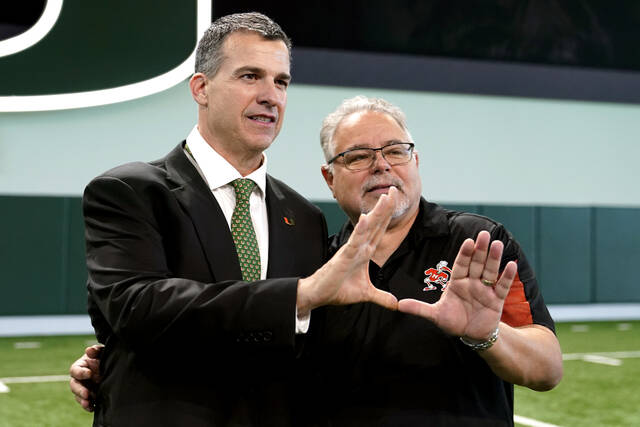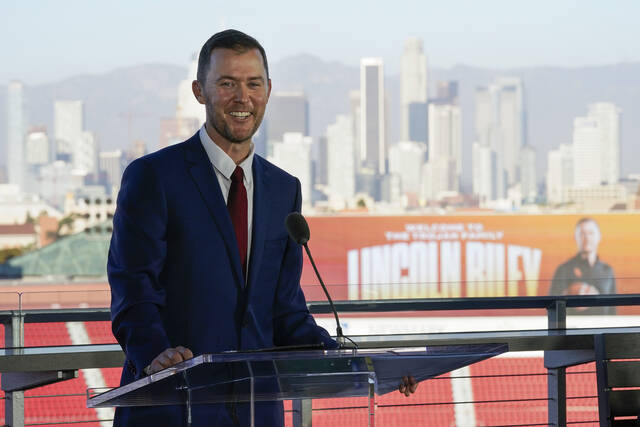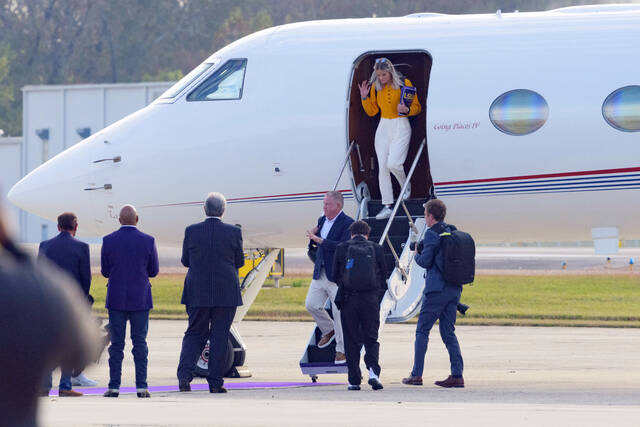


A new college football coach doesn’t come cheaply, especially when the one you’ve targeted has a well-paying gig at Nike’s Oregon campus.
Fortunately for the University of Miami, the school’s hospital system raked in record profits last year during the devastating COVID-19 pandemic.
Turning lemons into lemonade, the U threw some of that coronavirus cash at Mario Cristobal in what may be the ultimate indictment of college athletics — not to mention our health-care system and the nation’s entire set of misguided priorities.
Of course, the Hurricanes were merely the latest to join the crowd when they lured Cristobal away from Nike-backed Oregon and its wide array of ugly uniforms, clumsily working out a 10-year, $80-million deal while Manny Diaz was still their coach.
Indeed, it’s already been quite an offseason for a season that still has a month to go.
Eager to raise its fallen star, Southern Cal plucked Lincoln Riley away from Oklahoma with a massive financial package that was surely somewhere north of $100 million, though the exact details were not available from the private university.
Not to be outdone, LSU stunningly persuaded Brian Kelly, the winningest coach in Notre Dame history, to leave the Fighting Irish while they were still in contention for a berth in the College Football Playoff.
(They just missed out with a No. 5 ranking, which at least prevented the ludicrous scenario of Kelly’s hastily appointed successor, Marcus Freeman, making his coaching debut in a national semifinal game.)
Kelly, who has never won a national championship and will be hard-pressed to do so in Baton Rouge as long as that Nick Saban guy rules in Tuscaloosa, nevertheless received a staggering 10-year, $95 million deal from LSU.
We presume he used some of that money to take a crash course in Cajun-speak, because the Massachusetts native who has never coached in the Deep South suddenly sounded like he just rolled in from an alligator hunt on the bayou.
The massive expenditure comes on top of the $16.8 million buyout that the Tigers agreed to pay former coach Ed Orgeron, who was dumped just two years after winning a fortuitous national title while Joe Burrow was his QB.
Big-money boosters undoubtedly stepped in to largely fund the huge deals at USC and LSU — hey, rich people can spent their money however they like — but Miami’s hiring of Cristobal raised some troubling red flags.
You see, the pandemic proved to be a boon to the University of Miami’s healthcare operations, which was the school’s strongest area of growth over the past year.
Saying the quiet part out loud, Miami officials openly stated they would funnel some of that reported $400 million profit into their struggling athletic program.
The hiring of Cristobal, a former Hurricanes players who went 35-13 with a pair of Pac-12 titles in five years at Oregon, is a big part of the effort to restore the school to its 1980s and ’90s gridiron glory.
Like USC, Miami is a private university that can prioritize its spending however it chooses.
One can certainly make the case — look no further than Saban’s impact at Alabama — that a successful football team can more than pay for itself by bolstering a university’s national reputation and fundraising efforts.
But no one worth their weight in public relations would advise a school to link a worldwide health crisis, one that has claimed nearly 800,000 American lives and more than 5 million victims around the world, to more wins on the football field.
That’s downright sick.
In another PR blunder, Miami started its pursuit of Cristobal while Diaz was uncomfortably still dangling on the payroll.
When the Hurricanes were certain they would get their man, Diaz was fired.
“I am disappointed in the university’s decision and the manner in which this played out over the last few weeks,” the ousted coach said. “The uncertainty impacted our team, our staff and their families — these are real people that gave everything to this program. For that, for them, I hurt.”
Of course, Diaz conveniently failed to mention how he got the job in first place, abandoning Temple just 17 days after he was hired in December 2018, bolting for Miami as soon as he learned of Mark Richt’s surprise retirement.
Coach Karma got the final laugh, it would seem.
The Hurricanes weren’t the only ones blundering their way through one PR crisis after another.
Kelly’s departure from Notre Dame could provide a textbook full of examples on how not to do a job transition.
His assistant coaches and players found out through social media that he was heading to LSU. He finally delivered the news himself in an uncomfortable, early morning meeting that lasted about as long as a three-and-out possession. Then there was that Cajun accent he conjured up when speaking at an LSU basketball game.
Riley’s introduction at USC was also cringeworthy, looking like something that Garth and Wayne might’ve filmed in their parent’s basement (look it up, kids) — not the motion picture capital of the world.
Of course, college athletics going out of its way to embarrass itself is nothing new.
There are far more serious concerns than fake accents and amateurish pep rallies.
Our priorities are all out of whack.
Sadly, no one seems to care.
___
Paul Newberry is a national sports columnist for The Associated Press. Write to him at pnewberry(at)ap.org or at https://twitter.com/pnewberry1963 and check out his work at https://apnews.com/search/paulnewberry
___
More AP college football: https://apnews.com/hub/college-football and https://twitter.com/AP_Top25 Sign up for the AP’s college football newsletter: https://apnews.com/cfbtop25




